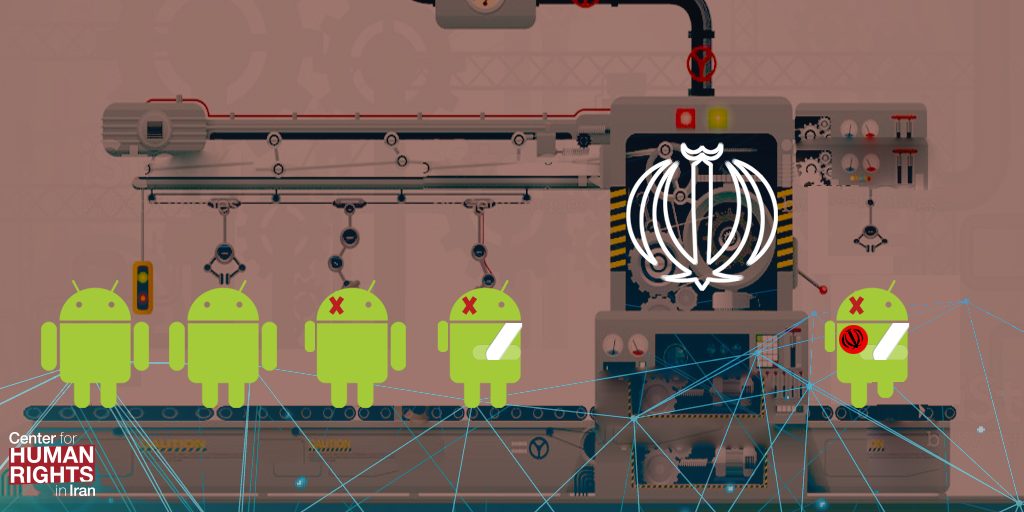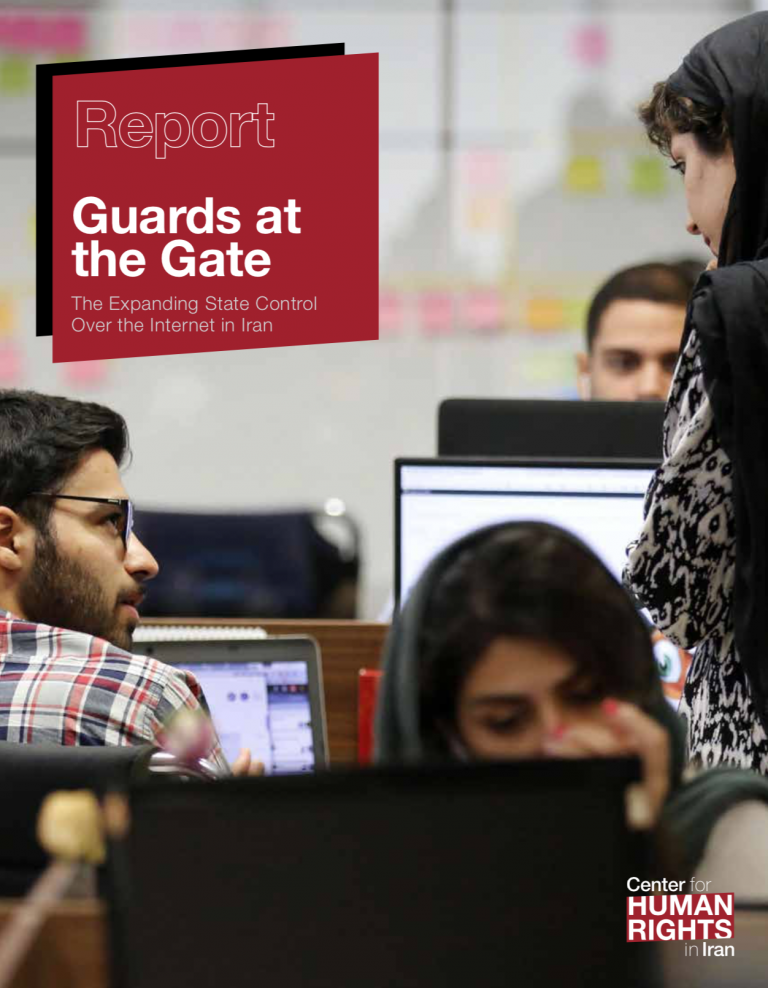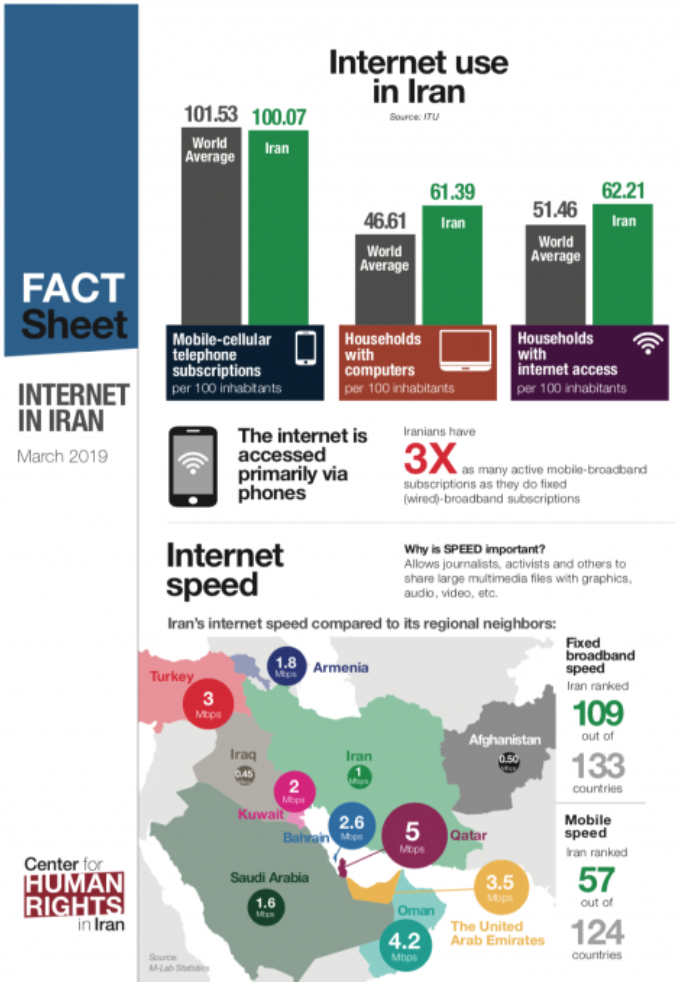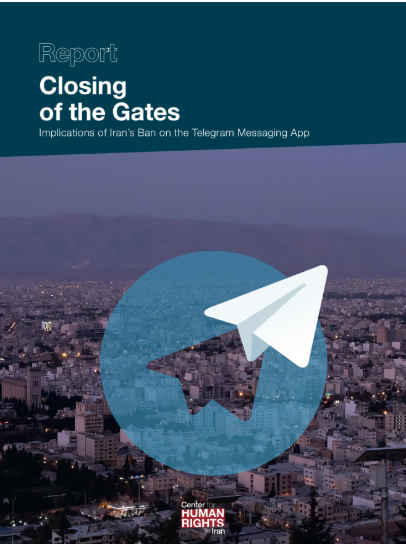Brushing Off Security Concerns, Telecoms Minister Touts Iranian-Made Mobile Phone Operating System

Telecommunications Minister Mohammad Javad Azari Jahromi announced on July 7, 2019, the development of an Iranian-made version of the Android operating system (OS) by a team of students at the Sharif University of Technology in Tehran.
Taking into account the Iranian government’s documented history of monitoring and collecting private online user data, particularly from apps and websites with servers based in Iran, the “Aria Mini” OS could come equipped with a range of security issues.
The Center for Human Rights in Iran (CHRI) cannot independently verify claims about Aria Mini as it is not currently publicly accessible.
However, the announcement of its development came soon after the Iranian government blocked access to a website that allows developers to download a raw version of the Android OS to develop their own versions.

Guards at the Gate: The Expanding State Control Over the Internet in Iran provides an in-depth review of Iran’s internet policies and initiatives, in particular, the development of its state-controlled National Internet Network (NIN), which gives the government newly expanded abilities to control Iranians’ access to the internet and monitor their online communication.
This strengthens the possibility that the government aims to ultimately force all Android users in the country to use Aria Mini.
That would not be an unusual move. Months before the Iranian government blocked access to the widely used Telegram messaging app, it was touting Iranian-made versions of it.
The OS will become available on phones made in Iran under the GLX brand name, an Iran-based company that manufactures mobile phones.
“Mobiles equipped with the Iranian Android OS, named Aria Mini, will come to the market in August [2019],” said GLX’s CEO Hamid Saeedi on July 8. “This version has no need for Google services and is completely free of them.”
Some tech experts in the country expressed privacy and security concerns about the OS following the publication of a report by the government-run newspaper, Iran, noting that the OS would block access to apps made by Google.
Confirming that Google apps would be inaccessible on Aria Mini, Ashkan Khosrowpour, the Hamshahri’s newspaper’s technology correspondent, tweeted:
“The specific goal of the Iranian mobile OS is to capture the Android market in Iran, which is 10 percent. It has been developed on the Android platform and for now, will only work on GLX phones. Access to all Google services such as Google Play, Gmail, cloud services and Google accounts have been blocked and replaced with domestic versions.”
Responding to security concerns, Jahromi stated via his official Instagram account on July 8:
“With this OS you will be able to use all international software but at the same time, Google will not be able to mess with your mobile. In other words, it’s now a one-way street: Iranians will be able to use all the services but they won’t be exposed to sanctions and isolation.”
Aria Mini Uses National Information Network’s Technical Infrastructure
The expansion of Iran’s National Information Network (NIN), which gives the government new abilities to control Iranians’ access to the internet and monitor online communications and activities, was accompanied by the development of various domestic services including a national email and search engine.
However, they have not attracted significant public usage due to their poor quality and inherent security issues.
On July 8, Telecommunications Minister Jahromi said Aria Mini is “safe.”
“This operating system, which is available to all, can pass all cybersecurity tests in the world,” he wrote on Instagram. “Evaluations by the [government-run] Center for Communication Security and Informational Technology indicate that the system is safe. We welcome domestic and international tests.”
But some Iranian users cited previous experiences of their Iranian-made technology and hardware becoming suddenly unusable after the government banned access to them.
“My question about the domestic android is, what will happen if the prosecutor issues a ban on installing the Telegram app? Will it be deleted from my phone? Will my phone become inoperable as long as I have Telegram on it? We had that experience with Snapp and Waze,” tweeted “Milad” on July 8.
In November 2017, subscribers of the Iranian-made Snapp transportation app received a message warning them that their accounts would be blocked if they did not delete the US-based Waze GPS app from their phones.
Jahromi Cites Sanctions While Telling Iranians to Use Iranian-Made Products

Internet in Iran, March 2019
Since the US withdrew from the Iranian nuclear deal and re-imposed sanctions on the Islamic Republic, Telecommunications Minister Jahromi has increasingly pointed to the sanctions while encouraging users in the country to use homemade products and services.
In August 2017, after many popular Iranian apps that provided various online services were removed from Apple’s App Store due to the sanctions, Jahromi stated that Iran should create its own apps.
“In the past year, a number of Iranian phone apps have been deleted by American companies with different excuses,” Jahromi wrote on his Instagram page on July 8, 2019. “This greatly harmed Iranian businesses. It started with the action by Apple and then it spread to Google. Are we supposed to stand by and watch the work of our young people go to waste?”
He added: “Imagine waking up one day and noticing that your various Iranian apps for public transportation, food delivery, banking, and many other services have disappeared and deleted due to inference by another country. The development of an operating system [of our own] will help avoid such desperate situations.”
One Iranian app that was removed from the Apple App Store was the Snapp online taxi service.
A July 8, 2019, tweet by its CEO Jhubin Alaghband in response to Jahromi’s announcement about Aria Mini suggests the telecommunications minister’s argument has been gaining support.
“Iranians have the right to seek technological solutions that would improve the quality of their daily lives,” Alaghband wrote.
“In my opinion, it is worth supporting any active steps that have the people’s trust and can render current foreign restrictions ineffective,” he added. “Ultimately, I hope that the shadow of sanctions will soon be removed from our country.”
Two days earlier, on July 6, Alaghband had written an open letter to Apple CEO Tim Cook, criticizing the company for blocking Snapp.
“A million drivers and their families depend on Snapp for their livelihood,” he wrote. “Apps were clearly excluded when US sanctions were imposed a year ago and yet Apple, without any legal obligation, introduced restrictions that struck a heavy blow to Iranian apps that provide online services.
He added: “Presently, Apple denies licenses to any Iranian application [for use on its devices], disrupting apps on millions of devices and negating the efforts of hundreds of Iranian investors… The App Store is not just a store with ordinary products. It offers critical components for the use of the internet, therefore creating a big responsibility towards not just the US but all humanity. Please appreciate this important responsibility and reconsider your decision to deny the rights of some of your clients.”
Telecommunications Minister Jahromi has also pointed to Google’s ban in its app store of Iranian-made copies of the Telegram app as another reason Iranians should move over to Aria Mini.
Google banned the Telegram Talaeii and Hotgram apps in response to reports by internet freedom organizations including CHRI of the apps’ major security flaws.
In his Instagram post, Jahromi argued that Google’s ban was unjustified:
“In January 2018, the Telecommunications Ministry issued a statement that it does not approve apps based on the Telegram shell and now they have been deactivated by a judicial order. But the question is: Does Google act similarly with malware that… rob the people of their money and information? If data protection policies are to be respected, that should not be done arbitrarily.”






